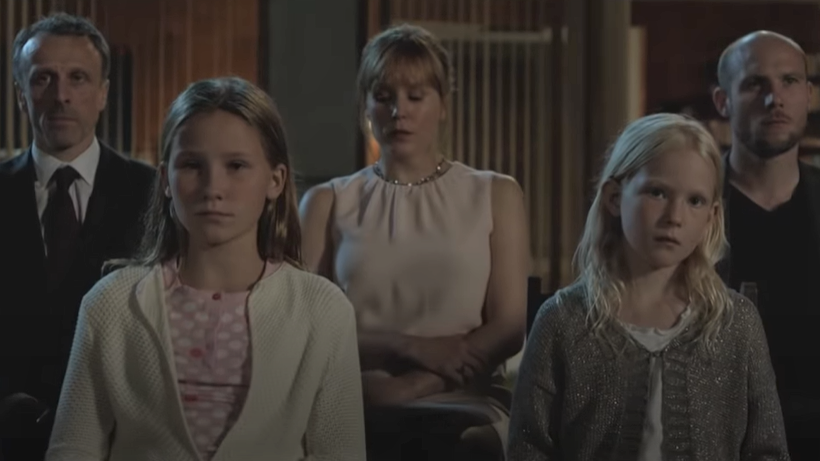Borgman
2013

Rated: NR
Genre: Dark Comedy, Drama
Country: Netherlands
Run-Time: 1h 52min
Director: Alex van Warmerdam
Cast
Jan Bijvoet…………………….Camiel Borgman
Hadewych Minis………….Marina
Jeroen Perceval…………….Richard
Sara Hjort Ditlevsen…….Stine
In theory, home invasion films should not offer much leeway for variation from the formula- but, then we should never underestimate good filmmakers and their ability to infuse innovative ideas into a tired subgenre. Take, for example, Michael Haneke’s Funny Games or Fede Álvarez’s Don’t Breathe. Or Alex van Warmerdam’s Borgman, a dark Dutch comedy that subverts the home invasion genre so much it hardly feels like it is applying its formula at all.
I first saw Borgman for free on Kanopy (yet another example of my library card coming in handy) It showed up repeatedly as a recommendation, so I finally gave in. And to my surprise I ended up being glad I did. This one is a bit of a treat. It is a darkly funny fable with some truly memorizing images to boot.
At the start of Borgman, we watch a small group of men, including a priest with a shotgun, hunting down a vagabond hiding in a very nifty underground layer deep in a forest. The vagabond, we learn later, is our title character, Camiel Borgman (Jan Bilvoet), though this name, like the others, may be only an alias. What Camiel has done is unknown but it is very clear these men are angry enough to murder him.
Camiel escapes, choosing to try his luck at a fresh start in the suburbs. He goes door to door asking if he could take a shower. Most people refuse. He even sets off one husband- who goes into a violent rage- after suggesting that he knows his wife. After being beaten nearly to death, Camiel knows he has found a family he wants to target. But for what?
At first, I felt Bilvoet was an odd choice of actors to play the title character. When a priest wants you dead you are clearly a menace, but Bilvoet’s well-timed escape is comical and Bilvoet looks more like an oafish tramp, than a hardened criminal and disguised devil. But the more you get to know his character, the more you understand that Bilvoet has a disarming charisma that belies the creepiness of his character’s later actions. His performance fits Borgman‘s dark comedic tone. So, when viewers get their first glimpse at Camiel’s power to manipulate dreams, his nudity and bizarre positions offer more humour than horror. But no matter the absurdity, Bilvoet always treats Camiel as having a certain sly confidence and air of mystery that suggests he’s in full control of the situation.
Camiel’s ambiguous motivations provide Warmerdam an opportunity to weave into the story social critiques about white guilt, entitlement, and class conflicts. Marina, the wife of the house, chastises her daughter for destroying a teddy bear, dreading up the image of those unfortunate children in poorer countries that- possibly- slaved to make it. Later, she tells Stine, her nanny, that her soldier boyfriend cannot spend the night because she has not met him. But in the very next scene, she allows Camiel to move his cronies into the guest house after only a brief introduction. Richard, Marina’s hot-tempered husband, does not even consider hiring one applicant for a gardener’s position simply because he is black. The duplicity of the suburban couple becomes a part of the dark satire, as any early empathy you may hold for the couple gradually diminishes. Camiel may have the power to manipulate people’s actions, but these scenes reveal Richard’s and Marina’s true selves. Is this why Camiel has chosen this family to intertwine his life with?
In another filmmaker’s hands, Borgman’s script could have easily been made into a horror movie, but then it would have been a lot easier to guess where the film is going. As a dark comedy, Warmerdam creates an air of doubt in a viewer’s mind about what Camiel’s goals might be. There is an unpredictability in the film that keeps it entertaining. That is not to say that Warmerdam doesn’t cross into horror, he just does sparingly, usually in quick violent flashes. Borgman contains several instances of murder and marital abuse, but Warmerdam limits the use of graphic gore to one particularly jarring, impactful scene.
As an oddity that employs its own surreal logic, Borgman’s plot makes more sense than most films of this nature. It is, however, understandable if you walk away a little bewildered. Warmerdam uses dark comedy to misdirect us right from the start. Although Warmerdam’s film was not specifically made to appeal to horror fans, fans of oddball horror films are likely to appreciate Borgman for what it is. Borgman is a vicious little fable that allows us to ponder the dark side of human nature while poking fun at suburban hypocrisy. It is also an extremely original home invasion tale that is playing on a whole other level. The mix of haunting imagery with an inventive, quirky script make the film well worth its nearly two-hour run-time.
If you are in the mood for something different, give Borgman a try.
